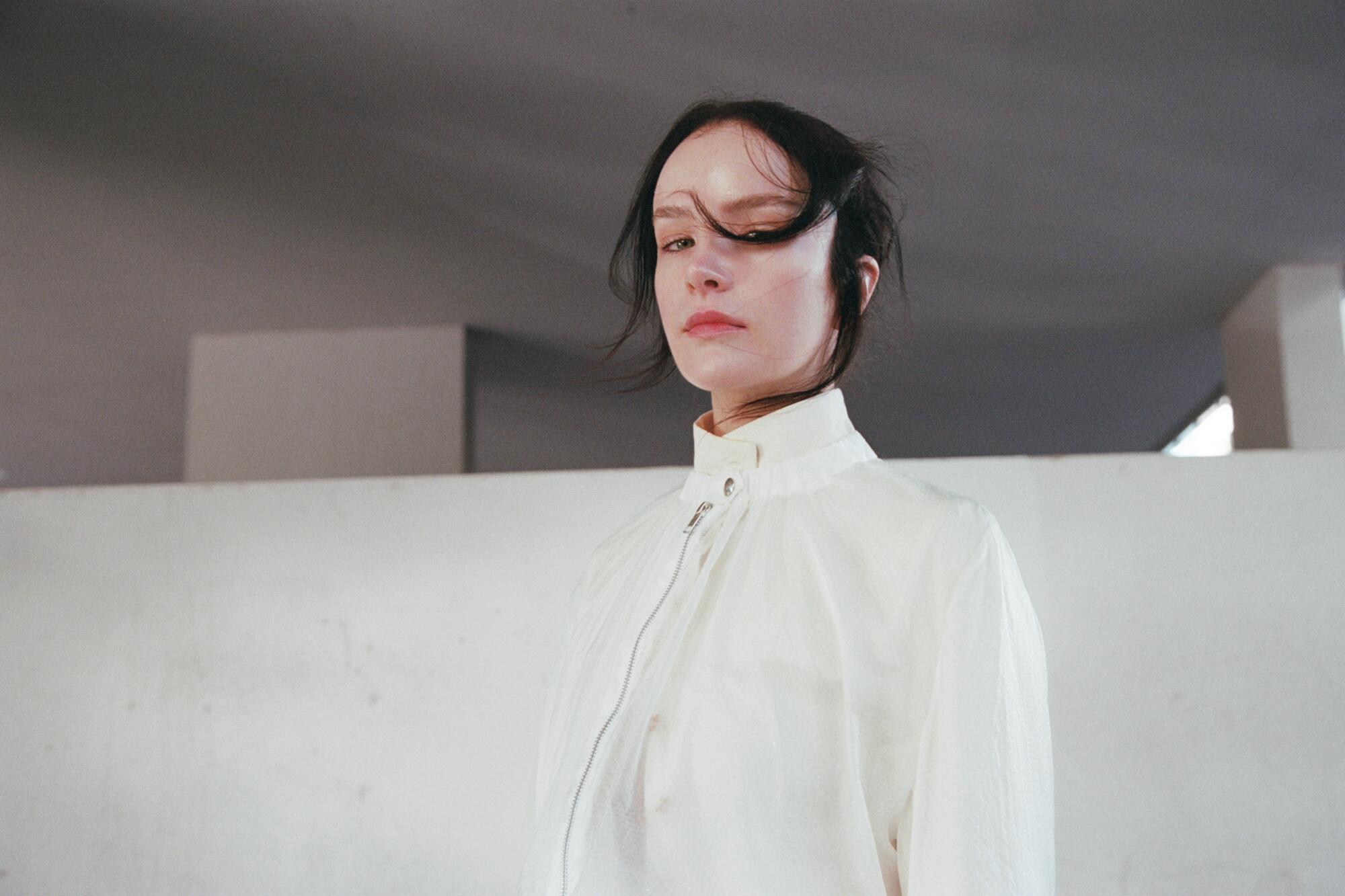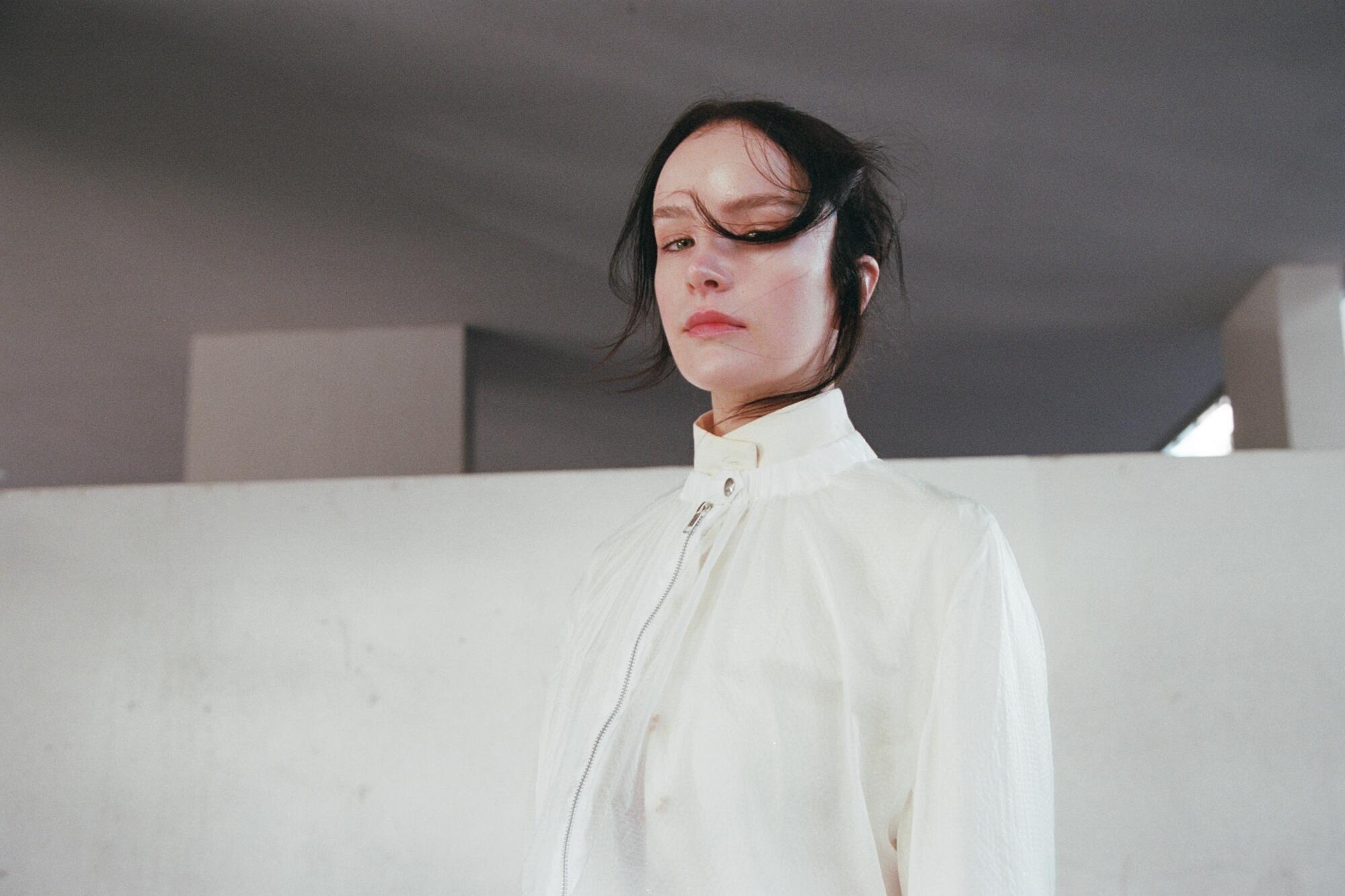Every night before going to bed, Ela Minus shuts off her phone.
Oftentimes, the Colombian artist-producer won’t even turn it back on until the following afternoon. One day, in mid-September, when Minus logged on, she received an unexpected flurry of messages from both close friends and people she hadn’t spoken to in years. Each notification was congratulatory, but Minus had no idea what had transpired the night before.
It turns out the Latin Grammy nominations had been announced — and her song “QQQQ,” off her 2025 sophomore album, “Día,” was nominated for Latin electronic music performance.
“I was very confused. Nobody said what was going on in their messages. They were just telling me congratulations,” says Minus, who laughs about the moment over our Zoom call. She dialed in from Mexico City, a few hours before catching a flight to Italy to kick off a new leg of her “Día” tour.
“As soon as I figured out that I was nominated, I turned my phone off again. I needed a second to myself. To be completely honest, it was not even a little bit in my radar. I didn’t even know we submitted anything.”
Since its release last January, “Día” has left lasting impressions on critics and fans alike. In 10 synth-powered tracks, Minus channels her fluctuating emotional state as she navigated a period of reckoning — characterized by a life almost entirely lived in airplanes, hotel rooms and foreign studios — through ominous synthesizer chords and blasts of vigorous dance beats.
Much like her music, her path to Latin Grammy-worthy acclaim has been anything but linear.
“It’s not like I started singing on television, and now I’m at the Latin Grammys. It’s been an interesting path of continuous surprises and unexpected turns,” says Minus. “Not to praise myself, but every time I’ve taken an unexpected turn or been presented with it, something amazing comes out of it.”

“Every time I’m in L.A. for a longer period of time, I feel like I retire into myself more. Staying downtown too, felt very aggressive, yet familiar to me,” says Minus, of how L.A. influenced her latest record.
(Alvaro Ariso)
Minus was born as Gabriela Jimeno Caldas, in Bogotá, Colombia. She got her start in music as a drummer in a local punk band called Ratón Pérez, which she joined at the age of 12. Her percussion skills led to her leaving Colombia to attend the Berklee College of Music, where she double majored in jazz drumming and music synthesis. At school, she was introduced to hardware and software synths, and continued to explore her drumming abilities by experimenting with electronica.
After working as a touring drummer and helping design synth software, Minus’ solo career started to take off with the release of her 2020 debut album, “acts of rebellion.” She created the entire project by herself, from the depths of her at-home studio in Brooklyn. Composed of icy club beats and steadfast synthetics, she describes the album as “sonically concise,” in that she intentionally used limited instrumentation.
When approaching her 2025 follow-up record, she says that she yearned to pick up new instruments, switch up the process and hopefully end up with an entirely different result.
In a sudden turn of events, her rent in New York quadrupled because of COVID-19 inflation rates, and she had to leave the city. She says her life quickly became a “mess.” But her next steps were clear as ever — instead of settling into a new apartment, she took on a nomadic lifestyle, with making new music as her only goal.
“I wanted to start and finish a record in the moment, while all of this is happening, and when I’m feeling this way,” says Minus, who says she was feeling a self-imposed artistic pressure. “I figured I could postpone my personal life out of wanting to make this record.”
Over the course of six months, she hopped from city to city, living out of her suitcase and renting recording studios. She ended up in places like London, Mexico City and Seattle. The repetitious process of packing up and settling into new places allowed her to easily decipher which tracks she wanted to keep pushing and which ones she would leave behind.
Along her journey, she lived in downtown Los Angeles for a short period of time. She says she finds the city to be a bit “alienating” with a “uniquely heavy” energy. To her luck, the city’s ethos aligned with the sonic soundscape she was building out in “Día.”
“Every time I’m in L.A. for a longer period of time, I feel like I retire into myself more. Staying downtown too, felt very aggressive, yet familiar to me,” says Minus, who noted the lack of people walking, the amount of traffic in the streets and the boundless nature of Los Angeles.
The album began at a low point in Minus’ life, where she seems to be going through an identity crisis. Over spacey sirens and an accumulating bass line, on “Broken,” she admits to being “a fool / acting all cool” and being on her knees, without a sense of faith. Throughout the first several tracks, she confronts her inner monologue through candid lyrics, offering herself a reality check.
“Producing beats with really low bass lines feels comfortable to me. It makes me want to open up naturally to get to the point of writing lyrics and singing. When the production is more sparse, like with a guitar, it’s harder to write more vulnerably. It feels kinda cheesy,” says Minus.
“In myself, there’s this constant cohabitation of dark and light and aggressive and sweet sounds,” she continues. So when vulnerable feelings come out, the really hardcore, distorted sounds follow.”
Songs like “Idk” and “Abrir Monte” simulate the experience of being submerged as a muffled, yet pounding bass line takes charge. Other times, as in “Idols,” Minus’ dissected blend of club pop and dark ambient sounds lends a grimy, industrial feel to her mechanical melodies. She captures the commonplace (yet cathartic) experience of losing yourself in a sweaty mass of limbs on a dance floor.
The Latin Grammy-nominated track “QQQQ” marks a turning point in the album. It was a song she wrote in a matter of hours to depict her own mindset change. “I was very aware that [for] the first half of the record, there was a lot of tension. I just needed a moment of release for this [album] to land fully. I needed a moment of uncontrollable sobbing on the dance floor.”
The album ends with her resolving to confront her struggles with self-acceptance, with the frankly written “I Want To Be Better” — which escalates with the feverish punk pulse of “Onwards.”
To her, the album is equal parts apocalyptic and hopeful, reflecting both the chaos of the outside world and her newfound inner peace. Since making the record and performing it frequently, she says she’s internalized the lessons she learned along the way. “When you’re going through something, sometimes the only thing you can trust is time. Your perspective will change, maybe for better or for worse.
“Time heals,” adds Minus. “That’s something I learned for sure.”
Ela Minus will be headlining at the Echoplex in Echo Park on Oct. 29.
